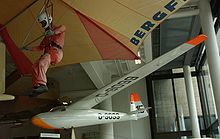Schleicher Ka 6
| Schleicher Ka 6 Rhön sailor | |
|---|---|

|
|
| Type: | Glider in timber |
| Design country: | |
| Manufacturer: | |
| First flight: |
October 29, 1955 |
| Production time: |
1955-1970 |
| Number of pieces: |
> 1000 (all series) |
The Ka 6 , in particular the K 6 E , represents the high point and the end of the development of gliders in pure wood construction at the Schleicher company . It was developed as a single-seat high-performance glider and is still around 440 in Germany alone Commitment. The Ka 6 got the nickname Rhönsegler . A license production took place as ES-Ka6 at Edmund Schneider Ltd. in Australia.
history
The approved series are:
- Ka 6, registered October 30, 1956
- Ka 6-0, approved October 30, 1956
- Ka 6 B and BR, first flight in 1957, registered on September 27, 1957
- Ka 6 BR-Pe, registered on May 20, 1960
- Ka 6 BS, registered on January 29, 1963 (type certificate limited to one copy)
- Ka 6 CR, first flight 1958, registered on February 24, 1959
- Ka 6 CR-Pe, approved May 20, 1960
- K 6 E, first flight in 1965, registered on July 29, 1965
The Ka 6 quickly became very popular when Heinz Huth became world champion in the standard class with it in 1960 and 1963.
construction
The Ka 6 is made entirely of wood. Only the nose of the fuselage is occasionally made of chased aluminum or GRP , the hood is made of blown Plexiglas and the bolts and fittings are made of metal. It is a single-seat, cantilevered shoulder-wing wing whose horizontal stabilizer is placed on the fuselage. The last stage of evolution of the Ka 6 is the Ka 6 E, which actually emerged from the K 10 . In the Ka 6 E version, the FX 40 (inside) profile is used on the FX 30 (outside) of the K 10. The horizontal stabilizer of the Ka 6 E is designed as a pendulum rudder (as already with the types Ka 6 BR-Pe and Ka 6 CR-Pe) , the brake flaps are made of Dural; GRP parts were also processed, such as the fuselage nose, upper fuselage shell in front of the cockpit, lower fuselage shell in front of the landing gear, the wing cladding , the wing tips ( edge arch ) and aerodynamic cladding at the transition from the fuselage to the underside of the wing, as well as the transition from the upper side of the fuselage to the fin.
An intermediate stage after the Ka 6 CR and before the K 6 E was the K 10 . The fuselage of the K 6 E is 7 cm lower, which puts the pilot in a semi-recumbent position, and on some aircraft of this series the rudder pedals are no longer attached to the top of a fuselage bulkhead, but to the bottom of the cockpit floor. The hood is pulled forward longer and is even better adapted to the shape of the fuselage.
Flight characteristics
The Ka 6, although it is very good-natured, cannot hide that it is primarily optimized for performance and is therefore more demanding to fly than, for example, the K 8 developed for training . The Ka 6 was and is still popular today because of its extremely harmonious rudder coordination and maneuverability. Their good slow flight characteristics enable tight circles and thus good climbing values in thermals. Both the 3 ° offset and an ingenious steering mechanism prevent the flow from suddenly breaking off in slow flight. If the control stick is pulled back, both ailerons move upwards, which reduces the angle of attack in this area and thus the likelihood of a stall on the outer wing.
Technical specifications
| Parameter | Ka 6 CR (K 6 E) |
|---|---|
| constructor | Rudolf Kaiser |
| class | Club (formerly standard) |
| First flight | 1959 (1965) |
| number of pieces | ~ 850 (394) |
| Seats | 1 |
| design type | Wooden construction |
| Wing profile | Root: NACA 633-618 , middle wing: NACA 633-614 (FX 40 - FX 30) |
| span | 15.00 m |
| Wing loading | 24.19 kg / m² |
| Wing area | 12.4 m² |
| Glide ratio | 30 at 85 km / h (33 at 84 km / h) |
| Slightest sinking | 0.65 m / s at 72 km / h (0.71 m / s) |
| length | 6.68 m |
| Top speed | 200 km / h |
| Water ballast | none |
| Preparation mass | 185 kg |
| Max. Takeoff mass | 300 kg |
See also
Web links
- Alexander Schleicher GmbH & Co. Glider construction
- Ka 6 CR & K 6 E at sailplanedirectory.com
- www.hb-536.ch : Website for Ka 6 CR HB-536 with lots of additional information, sketches and drawings, accessed on January 6, 2010
Individual evidence
- ↑ Alexander Schleicher: All types of aircraft since 1951 , accessed on December 18, 2018.



